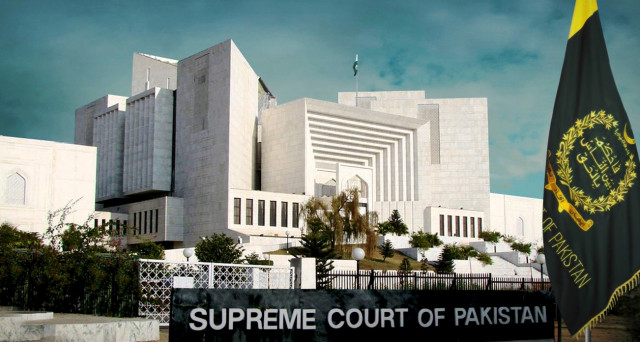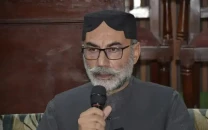‘PPP, PML-N manifestos stipulate judicial reforms’
"We strongly believe in the parliamentary system," the CJP remarked while hearing the 18th amendment case.

We strongly believe in the parliamentary system which is why, through the Judgment of July 31, we sent back the ordinances issued by the previous government on November 3 to parliament to decide its fate, Chief Justice Iftikhar Muhammad Chaudhry interjected as head of the 17-member larger SC bench hearing the challenge to some parts of the 18th amendment.
Counsel for the Punjab government Shahid Hamid picked up the thread of his arguments in defence of the piece of legislation by saying that the judicial commission exists in more than half the countries of the world.
No benefit can be expected by citing these examples because the environment in India and Pakistan is different from other countries. There is a spirit of cooperation and representation behind the judicial commissions in those countries, Justice Javed observed.
In Britain, the executive used to appoint judges but its role has completely been diminished, pursued Justice Ramday. But according to your formulations, previously the role of the executive was least in the appointment of judges which is now being enhanced, he said, adding “the independence of judiciary would be hurt through politically motivated appointment”.
You have cited 121 countries but not one nation’s law is similar to the law of Pakistan, the CJP observed.
Hamid replied that in 16 Islamic countries judicial commissions are functioning and in those countries head of the state appoints the judges and in the constitutions of all these countries, independence of judiciary has been ensured.
In 11 countries of the Commonwealth, either the judicial commission or the council appoints judges, Shahid Hamid pointed out. To this, Justice Asif Khosa said that in South Africa political parties are consulted for the appointment of judges. “The deputy Chief Justice of the constitutional court of South Africa told me that because he spent ten years in jail with Nelson Mandela, that’s why he was appointed a judge.”
Britain is the pioneer of the parliamentary system, so is there any role of prime minister in the judicial appointments, Justice Saqib Nisar asked Hamid to which he replied in the negative, saying the law minster performs this function.
“However, parliaments have been empowered in five countries of the Commonwealth, including Britain, to remove the judges,” he added.
He argued that it was included in the manifesto of the PML-N to bring reforms in the judicial system after the restoration of the judiciary to which Justice Saqib observed it was included in PPP’s manifesto as well. Did the people of Pakistan give mandate to them to do so?
Wasn’t the Charter of Democracy just meant for their own benefit? Justice Anwar Jamali asked. Wasn’t the bar on becoming Prime Minster a third time the central point of COD?
Hamid replied that the Charter of Democracy came into existence only for bringing stability in the democratic system and the bar on becoming Prime Minster a third time was imposed by a dictator to stop two political giants.
“We are in opposition but for the first time in history the Public Accounts Committee is working in an effective manner,” Hamid said, adding that PML-N on public demand increased the strength of judicial commission and the oversight by the parliamentary committee is meant to keep the process of judges’ appointment transparent.
Shahid Hamid will continue his arguments on Thursday (today).
Published in The Express Tribune, August 19th, 2010.



















COMMENTS
Comments are moderated and generally will be posted if they are on-topic and not abusive.
For more information, please see our Comments FAQ